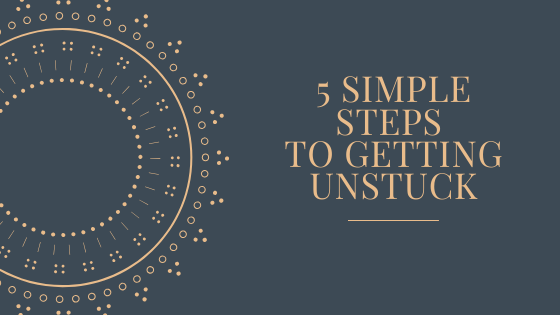Do you ever have those moments (hours, days, weeks, even years) when you just can’t seem to move forward on a project or an idea that’s important to you? Maybe it’s a slightly less-than-urgent project in the office or a piece you’re writing for your business blog, or maybe it’s that build-your-own-canoe kit sitting un-noticed and un-loved in the garage. Or perhaps it’s something much bigger like a potentially uncomfortable conversation you’ve been dreading – and putting off – with your boss or your team or your spouse or your neighbor. Whatever your thing, we all have those situations and circumstances where we find ourselves feeling stuck and unable to move forward.
In my experience and in working with clients, I’ve found that this often comes down to one of three reasons:
- Lack of clarity on next steps
- No longer/never was a priority
or – and let’s be honest, here –
- Abject fear
or some combination of the above.
Regardless of the reason, this stuff is real and can at best leave you with that nagging feeling that something important to you just isn’t getting the attention it needs and deserves, feeling all-out discouraged and disappointed in yourself for not getting the darn thing done or, worse still, stuck in a place that is truly not serving your personal growth or professional advancement.

Before you start beating yourself up over it – or taking a beating from your colleagues or significant other – (and I’ve been on both sides of that equation) I encourage you to instead try a different tact.
-
- First. Take a deep breath and accept and acknowledge where you are. Take a good, honest appraisal of the current reality as you see it. If this brings up feelings of frustration or judgment, try to notice them and release them rather than expending energy giving yourself a hard time that you could be using to move forward.
-
- Second. Ask yourself why you haven’t moved this forward. Is it because you’re not sure what to do next? Is it something you are avoiding because the outcome is uncertain and you do have some fear around what might happen if you take the next step? Or is it possibly because it’s something that really isn’t all that important to you anymore – and could even be (gasp!) dropped from your to-do list entirely?
-
- Third. If after honest assessment you’ve determined that it IS still important to you, then ask yourself what is the next best step you could take to move ahead – with the difficult conversation, the blog post, or even that boat in your garage. Maybe you need to practice having the conversation with your spouse or do further technical research on questions you have about the office project or take a day off in nature to find a different space or mindset to inspire your writing.
-
- Fourth. Once you have your next step, check-in with yourself. How do you feel about taking that next step on a scale of 1 to 10 with 1 being “I’m not at all ready” and 10 being “I’m totally ready, confident and feel like this is the first thing I will do once I finish reading this blog post.” If you’re at a 10, great! You’ve finished this exercise in 4 steps and can move on from here. Often, however, I find clients at a 7, 8 or 9 but not quite at a 10. What this means most of the time is that you have not actually discovered your very next step yet. For instance, let’s say you decide that you just need to have that conversation with your boss and you rate it at an 8 of 10. Perhaps what’s holding you back is an interim step with yourself where you need to take the time to get clearer on what your concerns – and perhaps your proposed solutions – actually are before you attempt to articulate them to your boss.
-
- Fifth. So if you’re not yet at a 10 out of 10… Unpack it. In the project management world, where I’ve worked with teams and organizations for almost two decades to implement large-scale projects, this is where we take a big project and spend a morning or a day breaking it down into smaller pieces and tasks. We stay at it until we can’t break it down any further and we have clear, actionable next steps. I’m asking you to do a similar exercise for yourself.
This is a step that can sometimes be tough to do on your own so you might enroll a trusted friend, colleague or partner to help.
If you catch yourself saying yeah, I know this is true or I’ve heard it all before… ask yourself if you’ve really put it into practice. And if this sounds like a lot of work, what’s the cost to you if you continue to not move forward? I can tell you that if you begin to practice these steps regularly when you notice you’re stuck, they become much easier, habitual and this little exercise will get faster for you.
Have you spent the time to take an honest look at the current circumstances, unpack them enough to get clear on what’s holding you back, and then take a (different) action than you’ve taken before?
If not, then I encourage you to try it. On something small. Today.
Now, I’d love to hear from you.
-
- How do you move forward when you’re stuck? What helps you get moving again?
- Have you tried assessing where you are on a scale of 1-10?
- What specifically happened and how did you handle it?
Curious to see what coaching can do for you? Schedule a session!



